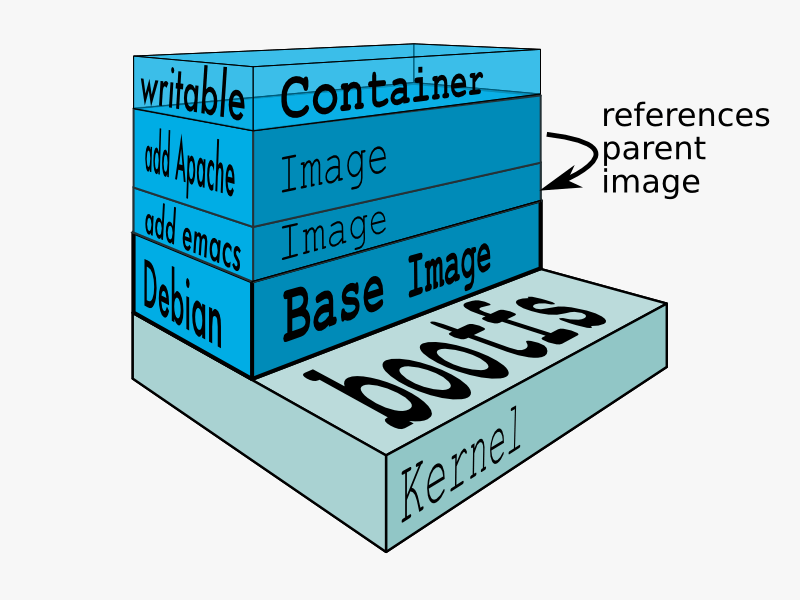A talk for BBLISA, 2014-10-08
Colin Walters, Platform Engineering, Red Hat, Inc.
Why is Colin here?
- Free Software
- Fun working in a global community
- Value of a subscription: Red Hat Enteprise Linux
Essential Atomic ingredients
- Host distribution
- Docker: Linux containers made easy
- SELinux and the Linux kernel: Container isolation, storage, namespaces, cgroups
- systemd: Making it easy to manage the base system
- rpm + OSTree: Compose and update the host system
- Kubernetes: Orchestrate containers
Project Atomic is not a distribution. It is a pattern around a set of upstream projects that can be applied to a distribution.
Deliverables
- Atomic Host + regularly updated tree
- Docker Base Image (also updated, though only for critical errata)
- Additional packages to create layered images
- Docker Registry? Maybe.
Background: Traditional
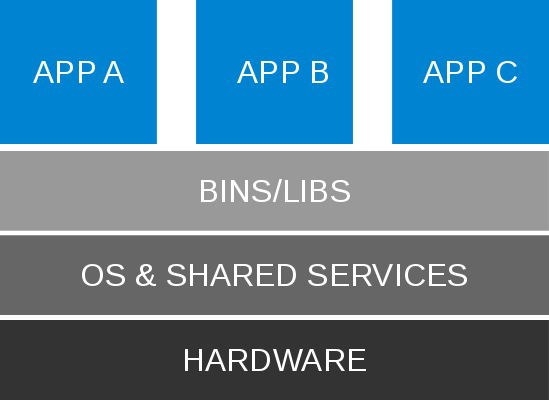
Background: Traditional
- Single userspace runtime (SCLs, per-user builds)
- Environment and life cycle defined by host OS
- Trend to isolate apps on hardware level
- Stable, long maintenance, few updates, hardware-centric
- Resources generally underutilized
Background: Virt and IaaS
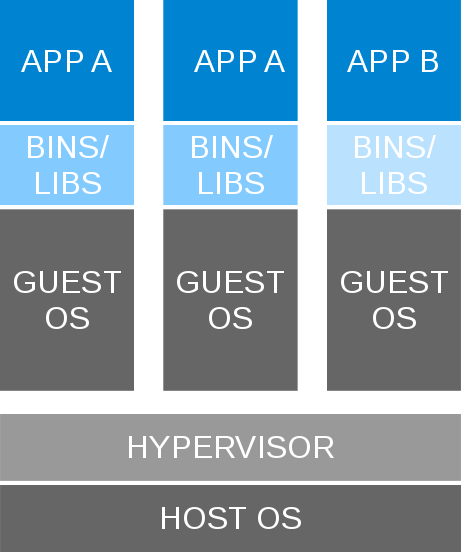
Background: Virt and IaaS
- App per VM
- Guest and lifecycle tied to VM
- Redundancy and overhead (multiple kernels, logging)
- Complex management / orchestration
Containerized
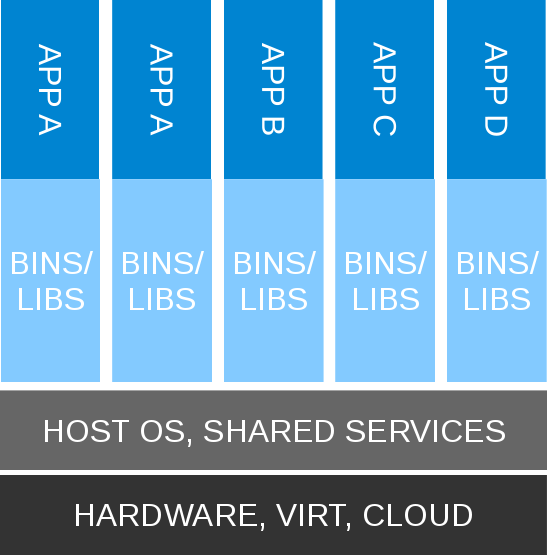
Containerized
- Applications are still isolated, but shared kernel
- Easily embed dependencies with apps
- Standard host services (SSH)
- Common logging, config mgmt, orchestration
Containerize all the things?
- Virt and containers are complementary
- Virt is a stronger security boundary
- No, you can't run Windows as a Linux container
Docker: What the Internet says

Docker: Linux containers made easy
- Union filesystem / snapshots
- Dockerfile: very easy to do something
- Port mapping
- Push/pull content (and the Hub)
- Most popular project on Github
Docker: The ugly
- Image security updates
- Running code as root
Docker: Demo time!
Classic problem: I have two web apps I want to run on the same host.
Assemble a Docker image with apache, from CentOS RPMs
$ cat > Dockerfile << EOF
FROM centos
RUN yum -y upgrade && yum -y install httpd && yum clean all
EXPOSE 80
CMD ["/usr/sbin/httpd", "-D", "FOREGROUND"]
EOF
$ sudo docker build -t cgwalters/apache .
Run it
$ sudo docker run -d -P cgwalters/apache
$ sudo docker ps -a
$ curl http://127.0.0.1:${port}
Container thinks it's port 80
Create derived images
$ cat > Dockerfile << EOF
FROM cgwalters/apache
echo "<body>Container one</body>" > /var/www/html/index.html
EOF
Run them both
# sudo docker run -d cgwalters/httpd1
# sudo docker run -d cgwalters/httpd2
# sudo docker ps
$ curl http://127.0.0.1:${firstport}
$ curl http://127.0.0.1:${secondport}
Isolation via namespaces
$ sudo docker run -t -i centos bash
# ps auxwf
# ip link
# mount
# hostname
Namespaces + cgroups in Linux kernel
CLONE_NEWPID, CLONE_NEWNET, CLONE_...
"Containers don't contain"
TL;DR: You are running code as root, kernel is large attack surface.
The Docker union filesystem
- Image: read-only, created locally or pulled and cached
- docker run creates a container from an image, fast
- Multiple backends: AUFS (out-of-tree kernel patch), BTRFS, Device Mapper (LVM)
- Future: overlayfs
Where's my data?
Written to the container by default (do not do this in production)
Do use docker run --rm
- Use Docker Volumes
- Bind mount to host storage: -v /hostpath:/containerpath
- Write to network data stores (Cassandra, Swift, MariaDB) and use remote logging
Atomic: default dedicated Docker storage
# lvm lvs
LV VG Attr LSize Pool Origin Data% Move Log Cpy%Sync Convert
docker-data atomicos -wi-ao---- 11.54g
docker-meta atomicos -wi-ao---- 1.00g
root atomicos -wi-ao---- 3.13g
swap atomicos -wi-ao---- 128.00m
# docker info |grep Space
Data Space Used: 594.6 Mb
Data Space Total: 11820.0 Mb
Metadata Space Used: 0.5 Mb
Metadata Space Total: 1024.0 Mb
#
Host not just kernel+docker
- Kubernetes
- systemd
- OpenSSH
- Storage: NFS, Gluster, ...
- cloud-init
- SSSD
- Networking (NetworkManager, future: +Open vSwitch)
- Core dump collection (abrt/systemd-coredump)
RPM+OSTree: Atomic host OS upgrades+rollback
- RPM: It's a UNIX system! I know this!
- OSTree: Atomically swap between bootable filesystem trees
- rpm-ostree (aka /usr/bin/atomic): Both client and server-side "compose" tooling
Traditional: yum/apt-get, etc.
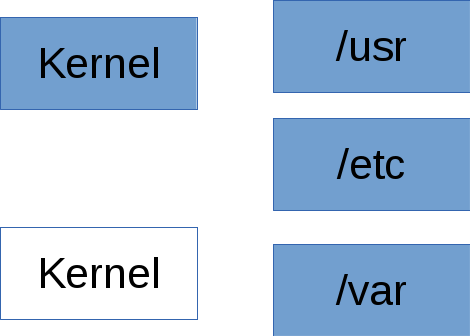
OSTree (as used by rpm-ostree)
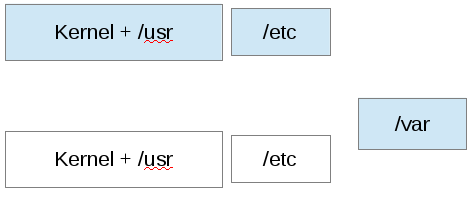
OSTree filesystem model
- /usr is a read-only bind mount. Always.
- /etc is "rebased" on upgrades - apply config diff to new /etc
- /var is untouched
- /home -> /var/home
Server: rpm-ostree compose tree
Client: rpm-ostree upgrade
- Input yum repositories + package set
- Kind of like: yum --installroot + git commit
- Unlike git, OSTree handles: uid+gid, xattrs (SELinux)
- Boot into new chroot
- OSTree also knows about bootloader, atomic swap
Demo time! Ctrl-C an OS upgrade
- Very satisfying
Multiple bootable roots, and starting an upgrade
# atomic status
TIMESTAMP (UTC) ID OSNAME REFSPEC
* 2014-10-07 19:29:55 9e8fd0f4bd rhel-atomic-host brew:rhel-atomic-host/7/x86_64/standard
2014-09-29 22:03:42 80986d2569 rhel-atomic-host brew:rhel-atomic-host/7/x86_64/standard
# atomic upgrade
Receiving objects: 71% (25/35) 2.4 MB
^C
Completing an upgrade
Copying /etc changes: 13 modified, 0 removed, 18 added
Transaction complete; bootconfig swap: yes deployment count change: 0)
Freed objects: 79.8 MB
Changed:
NetworkManager-1:0.9.9.1-26.git20140326.4dba720.l7_0.x86_64
NetworkManager-glib-1:0.9.9.1-26.git20140326.4dba720.l7_0.x86_64
cloud-init-0.7.5-1.l7_0.x86_64
dhclient-12:4.2.5-27.l7_0.1.x86_64
dhcp-common-12:4.2.5-27.l7_0.1.x86_64
dhcp-libs-12:4.2.5-27.l7_0.1.x86_64
docker-1.2.0-17.l7.x86_64
kernel-3.10.0-123.8.1.l7.x86_64
Removed:
PackageKit-glib-0.8.9-11.l7.x86_64
accountsservice-0.6.35-7.l7.x86_64
accountsservice-libs-0.6.35-7.l7.x86_64
make-1:3.82-21.l7.x86_64
Added:
bridge-utils-1.5-9.l7.x86_64
cadvisor-0.4.0-0.0.git5a6d06c0.l7.x86_64
etcd-0.4.6-3.l7.x86_64
irqbalance-2:1.0.6-5.l7.x86_64
kubernetes-0.2-0.9.gitf7a5ec3.l7.x86_64
Pre-reboot state
# atomic status
TIMESTAMP (UTC) ID OSNAME REFSPEC
2014-10-08 12:23:35 ed78ff0b4d rhel-atomic-host brew:rhel-atomic-host/7/x86_64/standard
* 2014-09-29 22:03:42 80986d2569 rhel-atomic-host brew:rhel-atomic-host/7/x86_64/standard
Reboot, something went wrong
# atomic rollback
Completely safe (and also atomic!) swap of bootloader entries.
Can I use Docker+Kubernetes via regular packages?
Yes.
For production, optimize storage like Atomic
Kubernetes
Container Farms
Even the Google Guys Say It's A Crappy Name
Where does Kubernetes Fit?
- Docker operates on single hosts
- Docker operates on individual containers (links excepted)
- Kubernetes spans hosts
- Kubernetes composes applications
Kubernetes Features
- Pods - Sets of Containers which share resources
- Services
- Non-localized network access
- Proxy/Load Balancing
- ReplicationController - HAish
Kubernetes Architecture
- Kubelet - container management agent
- App-Server - service portal
- Etcd - Clustering, State, Communications
- Kubecfg - Client
Contributors
- Google - Large Scale Cloud
- Robustness by fault tolerance and scaling
- Red Hat - PaaS and Enterprise Apps
- Robustness by point hardening
- Individual containers
- App level
- Service level
- Cluster level
TBD
- Smart Scheduling - Mesos?
- Secure Communications - Replace Etcd?
- Secure Container Environment
- Tenant Isolation
- Tenant secure access to containers
- Monitoring
- Container presence, loading, thrashing
- Container visibility
- Network traffic
- Storage
- Shared
- Persistent
References and Resources
- Kubernetes: https://github.com/GoogleCloudPlatform/kubernetes
- Etcd: https://github.com/coreos/etcd
- Freenode IRC: #google-containers
Status of Project Atomic
- Much slower than expected for Fedora 21
- CentOS Atomic SIG also spinning up
- CentOS Docker Base Image is updated and widely used
